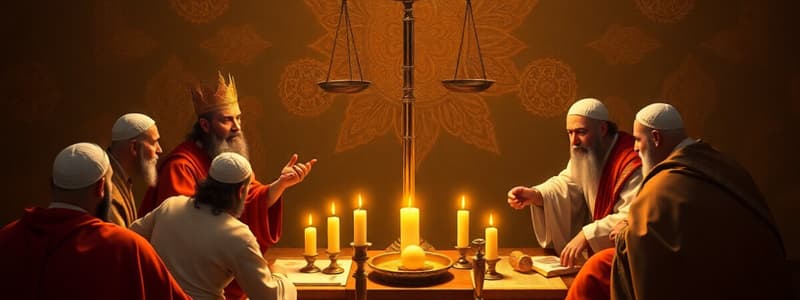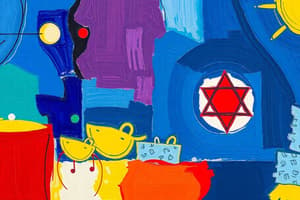Podcast
Questions and Answers
What is the significance of Hatarat Nedarim before Rosh Ha'Shana?
What is the significance of Hatarat Nedarim before Rosh Ha'Shana?
- It prepares individuals for the judgment day.
- It allows one to redefine their goals for the year.
- It symbolizes the renewal of faith.
- It emphasizes the seriousness of broken promises. (correct)
What does the term 'Simana Milta' convey?
What does the term 'Simana Milta' convey?
- Symbols are merely decorative.
- Traditions are outdated and irrelevant.
- Rituals are optional.
- Symbols hold actual significance. (correct)
What does being classified as a Beinoni imply on Rosh Hashana?
What does being classified as a Beinoni imply on Rosh Hashana?
- Immediate judgment and final decision.
- A state of spiritual perfection.
- Judgment is deferred until after repentance days. (correct)
- An automatic entry into the Book of Life.
What does the final meal on Erev YK symbolize?
What does the final meal on Erev YK symbolize?
What is a reason for wearing white on Yom Kippur?
What is a reason for wearing white on Yom Kippur?
What is the role of timing in the judgment of a Beinoni on Rosh Hashana?
What is the role of timing in the judgment of a Beinoni on Rosh Hashana?
What does the practice of Hatarat Nedarim signify before Rosh Ha'Shana?
What does the practice of Hatarat Nedarim signify before Rosh Ha'Shana?
Which of the following reflects the primary focus of Rosh Ha'Shana in relation to human behavior?
Which of the following reflects the primary focus of Rosh Ha'Shana in relation to human behavior?
What does the custom of Kapparot symbolize in relation to the High Holy Days?
What does the custom of Kapparot symbolize in relation to the High Holy Days?
What is the primary focus of the extra Shmone Esrei recited during Yom Kippur?
What is the primary focus of the extra Shmone Esrei recited during Yom Kippur?
What critical element must be addressed on Erev Yom Kippur before seeking forgiveness from Hashem?
What critical element must be addressed on Erev Yom Kippur before seeking forgiveness from Hashem?
What does the term 'Kol Nidrei' represent in the observance of Yom Kippur?
What does the term 'Kol Nidrei' represent in the observance of Yom Kippur?
Which of the following is correct regarding the significance of reading the book of Yona on Yom Kippur?
Which of the following is correct regarding the significance of reading the book of Yona on Yom Kippur?
What is the traditional action taken during the Vidur prayer?
What is the traditional action taken during the Vidur prayer?
What is the purpose behind the tradition of eating Apples or Challah in honey during Rosh Ha'Shana as explained through the Mashal story?
What is the purpose behind the tradition of eating Apples or Challah in honey during Rosh Ha'Shana as explained through the Mashal story?
What are the three books mentioned in Rosh Hashana customs?
What are the three books mentioned in Rosh Hashana customs?
What consequence does a Beinoni face on Rosh Hashana?
What consequence does a Beinoni face on Rosh Hashana?
What is the name of the custom involving taking chicken or money over one's head?
What is the name of the custom involving taking chicken or money over one's head?
What does the term 'Neila' refer to in the context of Yom Kippur?
What does the term 'Neila' refer to in the context of Yom Kippur?
What is the traditional meal called on Erev Yom Kippur?
What is the traditional meal called on Erev Yom Kippur?
During which prayer do individuals pound their chest?
During which prayer do individuals pound their chest?
Why is it important to seek forgiveness from people before Erev Yom Kippur?
Why is it important to seek forgiveness from people before Erev Yom Kippur?
What does the practice of saying Kol Nidrei involve?
What does the practice of saying Kol Nidrei involve?
What does the term 'Selichot' refer to in Rosh Hashana customs?
What does the term 'Selichot' refer to in Rosh Hashana customs?
What is a symbolic act associated with Rosh Hashana?
What is a symbolic act associated with Rosh Hashana?
What is the purpose of performing Hatarat Nedarim before Rosh Hashana?
What is the purpose of performing Hatarat Nedarim before Rosh Hashana?
Which of the following correctly describes a Beinoni during Rosh Hashana?
Which of the following correctly describes a Beinoni during Rosh Hashana?
What immediate action is taken if someone is identified as a Beinoni on Rosh Hashana?
What immediate action is taken if someone is identified as a Beinoni on Rosh Hashana?
Why is Rosh Hashana linked with the idea of judgment in relation to Adam Ha'Rishon?
Why is Rosh Hashana linked with the idea of judgment in relation to Adam Ha'Rishon?
What are the three categories of people mentioned in relation to the judgment process?
What are the three categories of people mentioned in relation to the judgment process?
What does the term 'Kapparot' refer to in Jewish customs?
What does the term 'Kapparot' refer to in Jewish customs?
What is the significance of the final meal before Yom Kippur, known as Seudat HaMafseket?
What is the significance of the final meal before Yom Kippur, known as Seudat HaMafseket?
What does wearing white on Yom Kippur symbolize?
What does wearing white on Yom Kippur symbolize?
What is the meaning of the word 'Neila' in the context of Yom Kippur?
What is the meaning of the word 'Neila' in the context of Yom Kippur?
Which prayer is recited three times during Yom Kippur and raised in intensity each time?
Which prayer is recited three times during Yom Kippur and raised in intensity each time?
Flashcards are hidden until you start studying
Study Notes
Rosh Hashana
- Hatarat Nedarim is the canceling of all promises and vows.
- People perform Hatarat Nedarim before Rosh Ha'Shana because it is a serious matter to have promises broken.
- It is customary to arise early and say selichot on Erev Rosh Hashana.
- Rosh Hashana is chosen as the day of judgement because Adam Ha'Rishon sinned and was judged on the same day, setting a precedent for all of mankind.
- The three categories of people judged on Rosh Hashana are: tzaddikim (righteous), beinonim (average), and reshaim (wicked).
- A beinoni is someone who is neither entirely righteous nor wicked; their judgment is considered even on the scales.
- If someone is considered a beinoni on Rosh Hashana, their judgment is postponed until Aseret Yimei Teshuva (the Ten Days of Repentance) and signed on Yom Kippur.
- The term "Simana Milta" means "symbols are real," emphasizing the significance of customs like eating apples and challah dipped in honey.
Yom Kippur
- Kapparot, a custom practiced on Erev Yom Kippur, involves taking chicken or money over one's head.
- The mitzvah on Erev Yom Kippur is to eat.
- It is crucial to ask forgiveness from people on Erev Yom Kippur because Hashem only forgives sins between us and others if those people have forgiven us.
- The act of Vidur, which involves pounding one's chest, is performed to express remorse and seek atonement.
- The final meal on Erev Yom Kippur is called Seudat HaMafseket.
- Four things one cannot do on Yom Kippur are:
- Eating (E)
- Drinking (D)
- Washing (W)
- Annointing oils or creams (A)
- Wearing leather shoes (L)
- We wear white on Yom Kippur because it symbolizes purity and cleanliness.
- Kol Nidrei, a specific prayer, is said three times, each time a bit louder.
- The extra Shmone Esrei added on Yom Kippur is called Neila.
- Neila means "closing."
- The book of Jonah is read on Yom Kippur to emphasize that Hashem accepts Teshuva (repentance).
Rosh Hashanah
- Hatarat Nedarim is the canceling of all promises and vows. This tradition helps people start the new year with a clean slate.
- Hatarat Nedarim is done before Rosh Hashanah to ensure that people are not burdened by broken promises.
- Another custom on Erev Rosh Hashanah is to arise early and say selichot.
- Rosh Hashanah is chosen as the day of judgment because it marks the anniversary of Adam and Eve's sin and their subsequent judgment.
- The three books of judgment are for the tzaddikim (righteous), beinonim (intermediate), and reshaim (wicked).
- A Beinoni is someone whose good and bad deeds are balanced, making their fate uncertain.
- If someone is considered a Beinoni on Rosh Hashanah, their judgment is postponed until Aseret Yimei Teshuva (Ten Days of Repentance) and finalized on Yom Kippur.
- Simana Milta means "symbols are real," emphasizing the significance of symbolic rituals.
Yom Kippur
- The custom of taking a chicken or money over one's head on Yom Kippur is called Kapparot. This symbolizes a transfer of sins.
- On Erev Yom Kippur, it is important to eat because it is the last meal before the fast.
- One should ask forgiveness from people on Erev Yom Kippur because Hashem only forgives sins between us and people if those people have forgiven us.
- During Vidur, a person pounds their chest, symbolizing genuine remorse.
- The final meal on Erev Yom Kippur is called Seudat HaMafseket, literally meaning "the meal of the break."
- Four things one cannot do on Yom Kippur: Eating, Drinking, Washing, Annointing oils or creams (or applying), Leather Shoes.
- Wearing white on Yom Kippur symbolizes purity and cleanliness.
- Kol Nidrei is a prayer recited three times, each time louder than the previous, symbolizing the increasing intensity of repentance.
- The extra Shmone Esrei prayer recited on Yom Kippur is called Neila, meaning "closing," referring to the closing of the gates of forgiveness.
- Reading the book of Jonah on Yom Kippur emphasizes that Hashem accepts repentance.
Rosh Hashana
- Hatarat Nedarim: The practice of cancelling all promises and vows before Rosh Hashana.
- Reason for Hatarat Nedarim: It's considered serious to break promises, so people seek to free themselves from any potential transgressions.
- Custom on Erev Rosh Hashana: Arise early and recite Selichot (penitential prayers).
- Reason for Rosh Hashana as Judgement Day: It commemorates the day Adam HaRishon (the first man) sinned and was judged, symbolizing the annual judgement of all humanity.
- Three Books of Judgement: Tzadikim (righteous), Beinonim (intermediate), Resha'im (wicked).
- Beinoni: Someone whose merits and demerits are equal.
- Beinoni Judgement: Their judgement is postponed until Aseret Yimei Teshuva (Ten Days of Repentance) and finalized on Yom Kippur.
- Simana Milta: Symbols are real, reflecting a profound meaning.
- Apple and Honey Analogy: A grandmother forgets to honor her grandchild's birthday, symbolizing the importance of remembering God's kindness throughout the year.
Yom Kippur
- Kapparot: A custom where people pass a chicken or money over their heads, symbolizing a transfer of sins.
- Mitzvah on Erev Yom Kippur: To eat a large meal.
- Forgiveness on Erev Yom Kippur: It's essential to seek forgiveness from others because God only forgives sins between us and others if those people have already forgiven us.
- Vidur: Practice of pounding one's chest during confession, symbolizing remorse and self-reflection.
- Seudat HaMafseket: The final meal eaten before Yom Kippur.
- Four Forbidden Actions on Yom Kippur: Eating, drinking, washing, anointing oneself with oils or creams, and wearing leather shoes.
- Reason for White Clothing on Yom Kippur: Symbolizes purity and cleanliness.
- Kol Nidrei: A prayer recited three times during Yom Kippur, with each recitation slightly louder than the last.
- Neila: The extra Amidah (prayer) added on Yom Kippur.
- Meaning of Neila: Closing, referring to the final hours of Yom Kippur.
- Reading Yona on Yom Kippur: A reminder that God accepts repentance, as symbolized by the prophet Jonah's acceptance after repentance.
Rosh Hashanah
- Hatarat Nedarim: The canceling of all promises and vows - It's a serious matter to have promises broken.
- Erev Rosh Hashanah Customs: Arise early and say selichot.
- Rosh Hashanah as Day of Judgement: Adam Ha'Rishon sinned and was judged on the same day, so too is all of mankind.
- Three Books: Tzadikim, beinonim, reshaim.
- Beinoni: Someone who is exactly balanced in their deeds.
- Beinoni's Judgement: Postponed until Aseret Yimei Teshuva and signed on Yom Kippur.
- Simana Milta: Symbols have real meaning.
Yom Kippur
- Kapparot: The custom of taking chicken or money over your head.
- Erev Yom Kippur Mitzvah: To eat.
- Forgiveness Before Yom Kippur: Hashem only forgives sins between you and other people if those people forgive you.
- Vidur: Pound your chest when reciting this prayer.
- Seudat HaMafseket: The final meal on Erev Yom Kippur.
- Yom Kippur Restrictions: Eating, drinking, washing, anointing oils or creams, and wearing leather shoes.
- White Clothing: Symbolizes purity and cleanliness.
- Kol Nidrei: A prayer recited three times, each time louder.
- Neila: The extra Shmone Esrei prayer added on Yom Kippur.
- Neila Meaning: Closing
- Yona: The reading of the book of Yona on Yom Kippur symbolizes Hashem's acceptance of repentance.
Studying That Suits You
Use AI to generate personalized quizzes and flashcards to suit your learning preferences.




